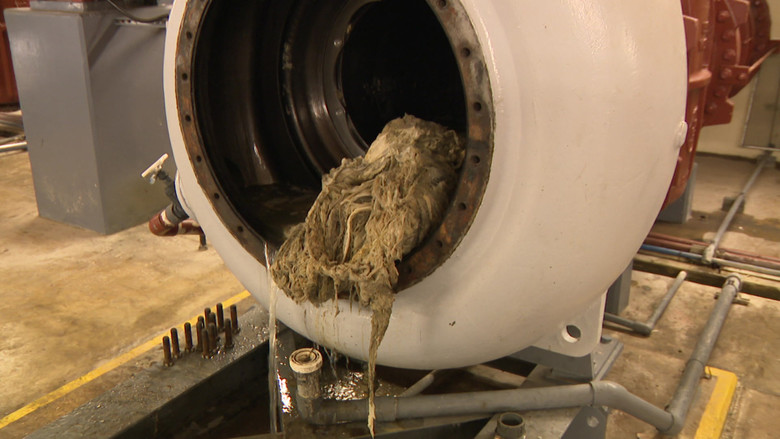
View all of CWEA’s coverage of the wipes crisis >
Congressman Alan Lowenthal (CA-47), today, joined with Congresswoman Lisa McClain (MI-10) to introduce bipartisan legislation to create a national standard for the labeling of non-flushable wet wipes. This common-sense standard would address the growing problem of these wipes being flushed into and creating obstructions in public sewer, stormwater, and wastewater systems. The bill is known as the Wastewater Infrastructure Pollution Prevention and Environmental Safety Act, or the WIPPES Act.
The WIPPES Act would require manufacturers of non-flushable wet wipes to clearly and prominently display a “DO NOT FLUSH” label on their packaging and would set fines for manufacturers that do not follow the regulation. The bill would also create an education program to inform consumers of the meaning of the new labeling, why the new labeling is required, and the adverse impact of these wipes on water infrastructure systems when flushed.
“The problem of flushed wet wipes has created tremendous problems for our water infrastructure for many years and is just one facet of our growing plastics waste pollution crisis,” Congressman Lowenthal said. “The WIPPES Act would provide consumers with the information they need to properly dispose of these wipes, and in doing so protect our water infrastructure and our environment.”
While wet wipe products have proliferated, many consumers do not know that many of these products do not rapidly breakdown or decompose and should not be flushed. Non-flushable wipes that are flushed have led to a major increase in clogged sewer and septic systems, damaged wastewater treatment facilities, and an increase in plastic micro-fibers from the wipes making their way through the wastewater system and back into the environment.
“Too often, false marketing leads people to flush wipes that are not safe for our plumbing infrastructure,” Congresswoman McClain said. “I’m proud to introduce this bipartisan legislation, which is key to maintaining and protecting our sewage systems.”
The bill is supported by national, state and local sanitation, public water, and clean water agencies and organizations, including the National Association of Clean Water Agencies (NACWA), the California Association of Sanitation Agencies (CASA), the Orange County Sanitation District, the Los Angeles County Sanitation Districts, the National Rural Water Association, the National Stewardship Action Council (NSAC), the Ocean Conservancy, Greenpeace US, and the Surfrider Foundation.
“On behalf of the hundreds of publicly-owned treatment works NACWA represents nationwide, I applaud Reps. Lowenthal and McClain for their bipartisan legislation to require Do Not Flush labeling on non-flushable wet wipes,” National Association of Clean Water Agencies CEO Adam Krantz said. “Non-flushable wipes do not break down as they travel through the sewer system, resulting in clogs and blockages that cost public utilities money, put workers at risk, and cause environmental harm. Simply put, Toilets are Not Trashcans. The Wastewater Infrastructure Pollution Prevention and Environmental Safety Act would require labeling for non-flushable wet wipes, a reasonable approach to protect homeowners, wastewater infrastructure, and the environment. NACWA looks forward to continuing to work with Congress to advance this important legislation.”
“We applaud Representatives Alan Lowenthal and Lisa McClain for introducing the WIPPES Act,” Executive Director of the California Association of Sanitation Agencies Adam Link said. “This bipartisan legislation addresses a problem that has plagued local clean water agencies’ efforts to improve water quality for years. Consumers have been unwittingly and improperly disposing these single use, synthetic wipes by flushing them into sewers that then clog pipes, pumps, and treatment equipment. This bipartisan legislation is a commonsense approach to informing citizens on how to properly dispose of wipes and protect the billions of dollars ratepayers have invested to clean up our waterways and protect public health.”
“We applaud Representatives Lowenthal and McClain for their work on the issue of non-dispersible wipes in particular the proper labeling of wipes that are non-flushable,” Orange County Sanitation Board Chairman John B. Withers said. “The flushing of wipes can not only cause great damage to our infrastructure they can also have unintended effects on the surrounding environment by shedding microplastics into the wastewater system that can ultimately be discharged to the aquatic environment.”
“Many disposable wipes cause problems when flushed,” Los Angeles County Sanitation Districts Chief Engineer and General Manager Robert C. Ferrante said. “They can clog the pipes in your home and sewer system leading to sewage overflows and costly maintenance. The WIPPES Act will require prominent labeling for wipes that should not be flushed. We thank Representatives Alan Lowenthal and Lisa McClain for their leadership in introducing this important legislation to protect water quality”
To read the full text of the bill, click here.